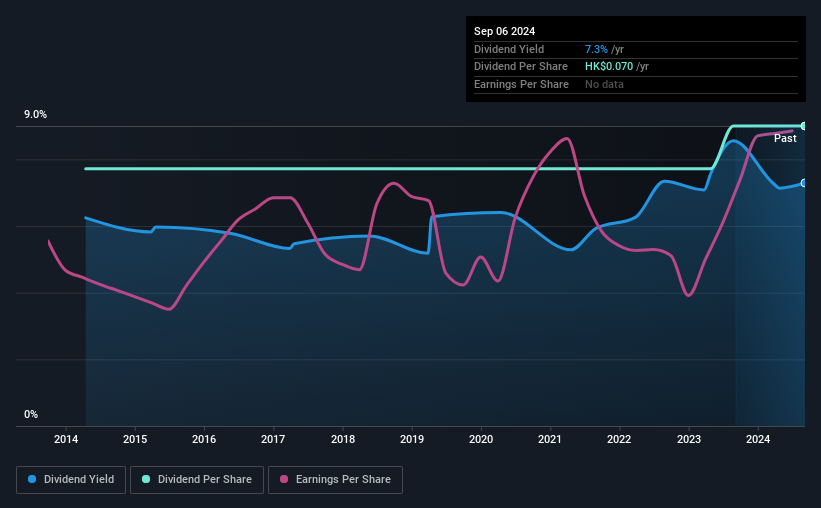
Readers hoping to buy Raymond Industrial Limited (HKG:229) for its dividend will need to make their move shortly, as the stock is about to trade ex-dividend. The ex-dividend date is one business day before a company's record date, which is the date on which the company determines which shareholders are entitled to receive a dividend. It is important to be aware of the ex-dividend date because any trade on the stock needs to have been settled on or before the record date. Thus, you can purchase Raymond Industrial's shares before the 11th of September in order to receive the dividend, which the company will pay on the 3rd of October.
The company's upcoming dividend is HK$0.04 a share, following on from the last 12 months, when the company distributed a total of HK$0.07 per share to shareholders. Looking at the last 12 months of distributions, Raymond Industrial has a trailing yield of approximately 7.3% on its current stock price of HK$0.96. Dividends are a major contributor to investment returns for long term holders, but only if the dividend continues to be paid. So we need to check whether the dividend payments are covered, and if earnings are growing.
See our latest analysis for Raymond Industrial
Dividends are typically paid out of company income, so if a company pays out more than it earned, its dividend is usually at a higher risk of being cut. Raymond Industrial is paying out an acceptable 58% of its profit, a common payout level among most companies. Yet cash flow is typically more important than profit for assessing dividend sustainability, so we should always check if the company generated enough cash to afford its dividend. Dividends consumed 69% of the company's free cash flow last year, which is within a normal range for most dividend-paying organisations.
It's encouraging to see that the dividend is covered by both profit and cash flow. This generally suggests the dividend is sustainable, as long as earnings don't drop precipitously.
Click here to see how much of its profit Raymond Industrial paid out over the last 12 months.

Have Earnings And Dividends Been Growing?
Companies with consistently growing earnings per share generally make the best dividend stocks, as they usually find it easier to grow dividends per share. Investors love dividends, so if earnings fall and the dividend is reduced, expect a stock to be sold off heavily at the same time. With that in mind, we're encouraged by the steady growth at Raymond Industrial, with earnings per share up 5.2% on average over the last five years. Decent historical earnings per share growth suggests Raymond Industrial has been effectively growing value for shareholders. However, it's now paying out more than half its earnings as dividends. Therefore it's unlikely that the company will be able to reinvest heavily in its business, which could presage slower growth in the future.
Many investors will assess a company's dividend performance by evaluating how much the dividend payments have changed over time. Since the start of our data, 10 years ago, Raymond Industrial has lifted its dividend by approximately 1.6% a year on average.
To Sum It Up
From a dividend perspective, should investors buy or avoid Raymond Industrial? Earnings per share growth has been unremarkable, and while the company is paying out a majority of its earnings and cash flow in the form of dividends, the dividend payments don't appear excessive. In summary, it's hard to get excited about Raymond Industrial from a dividend perspective.
With that being said, if dividends aren't your biggest concern with Raymond Industrial, you should know about the other risks facing this business. Case in point: We've spotted 2 warning signs for Raymond Industrial you should be aware of.
A common investing mistake is buying the first interesting stock you see. Here you can find a full list of high-yield dividend stocks.
Have feedback on this article? Concerned about the content? Get in touch with us directly. Alternatively, email editorial-team (at) simplywallst.com.
This article by Simply Wall St is general in nature. We provide commentary based on historical data and analyst forecasts only using an unbiased methodology and our articles are not intended to be financial advice. It does not constitute a recommendation to buy or sell any stock, and does not take account of your objectives, or your financial situation. We aim to bring you long-term focused analysis driven by fundamental data. Note that our analysis may not factor in the latest price-sensitive company announcements or qualitative material. Simply Wall St has no position in any stocks mentioned.